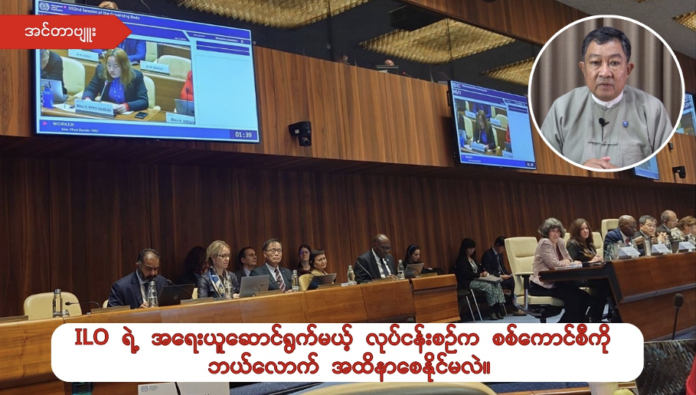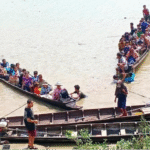An interview with CTUM President U Maung Maung about the ILO’s action against the military council under Article 33 of the ILO Constitution.
At the 352nd session of the International Labour Organization (ILO) Governing Body, held in Geneva, Switzerland, on 6 November, it was decided to take action against the military council under Article 33 of the ILO Constitution.
While the decision to take action has been confirmed, it will not be implemented at this meeting. Instead, measures will be taken in June 2025.
Than Lwin Times interviewed U Maung Maung, President of the Confederation of Trade Unions Myanmar (CTUM), regarding the ILO’s decision to take action against the military council, which has persistently violated labor rights since the coup.
The discussion covered the potential impact on the military council if the decision is carried out, as well as ongoing labor rights violations. Below are Part 1 and Part 2 of the interview.
Q: Since the military coup, to what extent have workers’ rights been violated by the military council?
A: Regarding the extent of labor rights violations, since the military council’s coup, the country is no longer under a democratic government. Under military rule, there is no freedom of association, and labor unions have been effectively banned. This constitutes a serious violation of labor rights. The firing of Civil Disobedience Movement (CDM) staff is a violation of labor rights. Many government employees with over 15 years of service were dismissed, which constitutes an unjust breach of their labor rights.
Since the coup, both the freedom of association and the right to form labour unions have been severely restricted, further exacerbating the violations of workers’ rights. Number 2 concerns the issue of firing CDM participants. CDM staff are being dismissed and driven out, which is a clear violation of their political freedom. These cases, including disputes over night shifts, one-sided decisions, and insults by supervisors, are all documented. The military’s mandatory conscription order is another violation. All of these actions are violations of basic labor rights.
Q: How important is Article 33, under which the ILO plans to take action against the military council? How much impact will this course of action have on the military council?
A: In 1998-99, we addressed the forced recruitment of child soldiers, which was also a violation of basic labor rights. Due to these violations, action was taken under Article 33 of the ILO Constitution. It is deeply shameful that the world now knows the military committed such crimes. Some argue that if the ILO takes action, the country’s economy will collapse. However, according to Article 33 of the ILO Constitution, we believe that we should not engage with those who continuously flout international standards.
What sets the ILO apart from other organizations is its tripartite structure, which includes representatives from governments, employers, and workers. When international actors collaborate with those who violate labor rights, they are essentially supporting a “poison tree”. These companies, whose products are sold worldwide—including in Europe—should understand that if the global market were to stop purchasing their goods, the losses they would incur would far exceed the profits gained from their military collaborations. This could ultimately reverse the situation.
Revolutionary leaders have made decisions to target the financial flows tied to the military under Article 33. Additionally, those who persist in committing crimes will be held accountable through international courts, with evidence presented for prosecution.
Q: How much can the ILO’s decision affect the military junta?
A: Actions are being taken against the military regime through an agency under the United Nations, which includes both employers and workers. We will present all cases of injustice carried out by the military, such as the arbitrary arrests of rice traders due to the high price of rice, gold traders for the rising cost of gold, and the detention of restaurant and hotel owners without evidence, accusing them of funding the People’s Defense Forces (PDF). Additionally, we will highlight the shutdown of fuel stations as part of this broader campaign.
Our goal is to disrupt the flow of international funds linked to most of the junta’s companies and the family of Min Aung Hlaing. Only then will the inflow of resources to the junta cease. What is encouraging is that we will reinforce the sanctions against the regime’s banks, by the United States and the United Kingdom. This will strengthen existing laws and complement the decisions made by the ILO. We will continue our efforts to block the use of ill-gotten wealth accumulated by the military regime and its affiliates from trade.
Q: Although Article 33 has been approved, the decision to take action will not be made until mid-2025. What impact will this delay have?
A: The ILO has a governing committee that meets three times a year. With the November meeting now concluded, the next step will be for the ILO Director-General to make a decision, as the Director-General holds the highest responsibility within the organization. Importantly, the Director-General is also a worker, representing workers’ interests.
At the 2025 conference, the governing committee has instructed the Director-General to draft a proposal for action under Article 33. As a result, Article 33 will undoubtedly have a significant impact on the military junta. During the next ILO meeting in March, the junta will need to decide whether to implement any reforms in response to the ongoing situation. The military junta will have to implement the ILO’s decisions in practice, not just through verbal commitments. If the junta continues to engage in actions that must be stopped, severe measures will be taken. In the upcoming March meeting, discussions will focus on what actions can be taken, which should be avoided, and what will have the most significant impact on the public.
In November 2024, Myanmar’s key allies, China and Russia, addressed the situation in Myanmar, but they are increasingly unable to shield the junta due to the numerous violations it has committed. While we anticipate that China and Russia may still offer some level of support for the junta in March, their ability to protect the regime is becoming more limited.
Additionally, many people have fled after completing mandatory three-month military training, as they were forcibly recruited by the army and local ward administrators. We have personally met and spoken with several of these deserters, inquiring about their recruitment experiences and how they were coerced into joining the military.
We will present it. There are no secrets. What the military group is doing cannot be disclosed domestically, so it is being shared internationally. We will continue to make these reports available. China and Russia are likely to deny the claims, but we will persist in our reporting. With the approval of Article 33, the Director-General is required to write a formal report, which will be submitted for approval in June next year. One certainty is that many companies will pull their international investments during this period. Moreover, if there is sustained pressure or action against the junta, more companies are likely to withdraw.
Q: Currently, there are concerns that international companies may exit Myanmar. What is your response to this?
A: During the period of the revolution, some companies shut down, and others faced significant losses. People are free to criticize us, but let’s take a moment to reflect on the situations from the previous term. When daily expenses become unaffordable, everyone must accept that it will directly affect them. Please read the letters carefully and let us know if we’re wrong. Do not claim this is due to the military’s influence. What I want to emphasize is that we need to examine all the factors. Article 33 is not just for those in industrial production. There are 400,000 people who have joined the CDM, and CDM staff have families too.
In addition, it is not just CDM, but farmers can no longer grow paddy because they are driven away. The persons who sells farm produce have gone out of business. These are economic collapes. We are still talking about the impacts of economic sanction. The country’s economy is already broken. I think it’s unnatural to be left alone when paddy, fuel and gold can’t be traded. I want to say this. What we are doing during the revolution is to change the system. We are working to eliminate the system that perpetually conquers through power and force.
According to practice, there would be labour unions. Workers could demand their labor rights. However, if workers were to ask for a pay raise now, the military would label it as a riot. Our goal is to end this practice. Over 80,000 young people have fled the country due to the military coup and the forced military service law. Among them are workers from industrial zones in Hlaingtharyar, Shwepyithar, and Bago. What we are fighting for is a revolution to change the system. This struggle is not only for those who left their jobs to join the CDM and their families, but also for employers—such as those in the food industry—who have been forced to shut down due to the junta’s actions.
Q: Finally, if U Maung Maung has any additional comments regarding the upcoming action by the ILO against the military council, please feel free to share.
A: As I mentioned earlier, the violation of basic labor rights is a serious issue because our country has signed international agreements that must be upheld. There is no mechanism in place to ensure freedom of association. While the military government may claim that freedom of association exists, I do not dispute that claim—of course, they will say it.
We must do everything we can. Can we truly protest openly and demand change? This is my message to those advocating for labor rights. We need to apply pressure and make our voices heard. I urge everyone to participate in the effort to end this oppressive system and bring about change. I call on both workers and employers to share the truth with us. Employers, in particular, should provide an honest account of the situation as it stands.
Sent by Than Lwin Times



